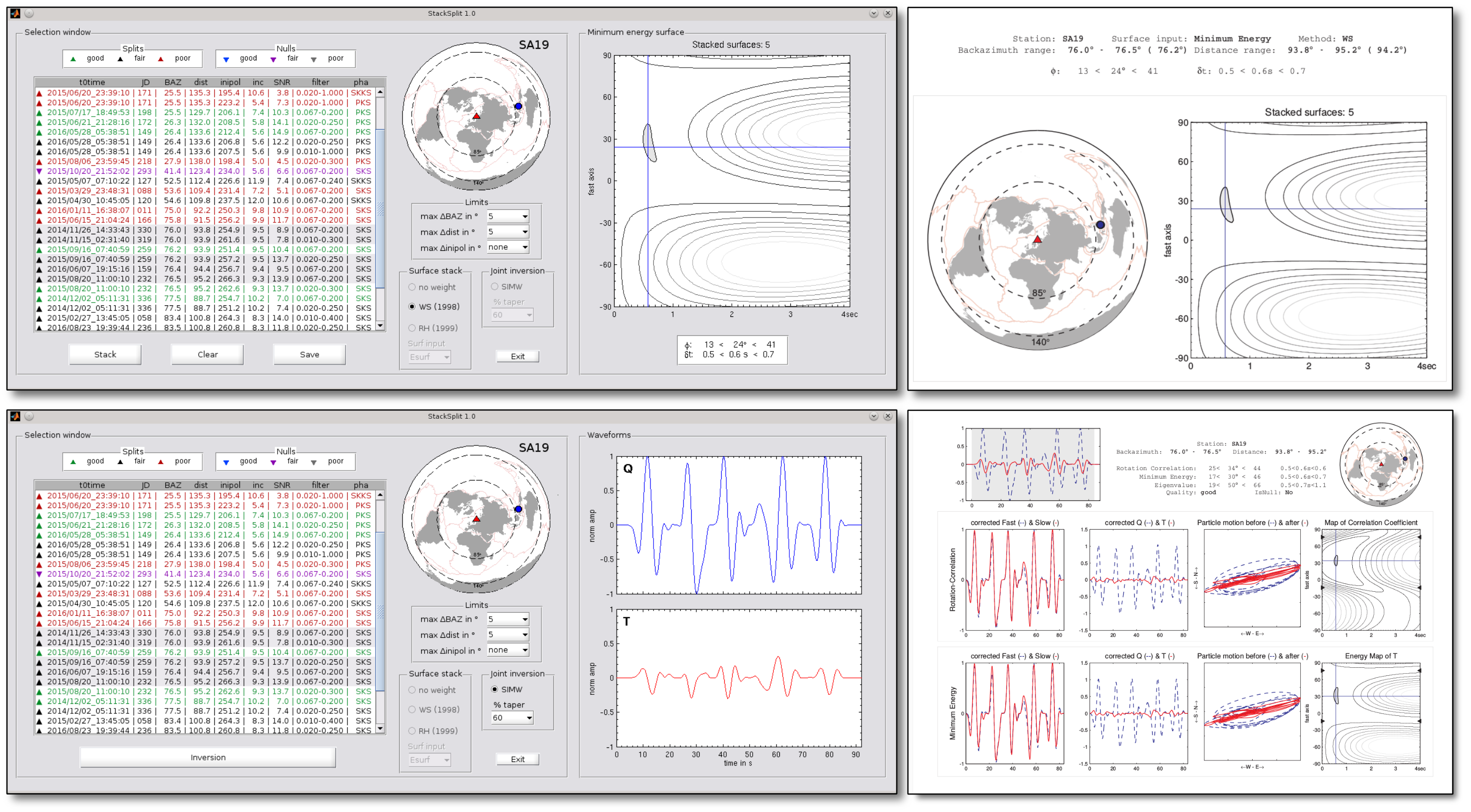StackSplit is a plugin for the MATLAB toolbox SplitLab (Wüstefeld et al., 2008) which allows applying multi-event techniques for shear wave splitting measurements (SWS) directly within the main program.
For details regarding installation and usage, see the UserGuide.
If you make use of StackSplit in your work, please acknowledge my paper in which the program is described:
- Grund, M. (2017), StackSplit - a plugin for multi-event shear wave splitting analyses in SplitLab, Computers & Geosciences, 105, 43-50, https://doi.org/10.1016/j.cageo.2017.04.015.
Optionally, you can also cite the Zenodo DOI given above, which refers to the latest version of this GitHub repository.
StackSplit grants easy access to four stacking schemes with which single SWS measurements made with SplitLab can be processed:
-
WS: stacking of error surfaces, normalized on the minimum/maximum (depending on input) of each single surface (Wolfe & Silver, 1998)
-
RH: modified WS method with weight depending on the SNR of each measurement and normalization regarding the available backazimuth directions (Restivo & Helffrich, 1999)
-
no weight: stacking of error surfaces without weighting following the PhD thesis of Wüstefeld (2007)
-
SIMW: simultaneous inversion of multiple waveforms in the time domain (Roy et al., 2017)
| StackSplit | SplitLab | MATLAB |
|---|---|---|
| dev (main branch) | 1.2.1, 1.0.5 (not tested) | >= 2020a (< 2020a might work, but not tested yet) |
| v3.0 (latest release) | 1.2.1, 1.0.5 (not tested) | >= 2020a (< 2020a might work, but not tested yet) |
| v2.0 | 1.2.1, 1.0.5 | >= 2014b (tested up to and including 2018b) |
| v1.0 | 1.2.1, 1.0.5 | <= 2014a |
For details regarding the different StackSplit versions, see the Changelog.
Did you find a bug or have suggestions for improvements? Simply open a new issue or pull request here on GitHub.
-
SplitLab 1.2.1: Updated and expanded version (recommended to use with StackSplit)
-
SplitLab 1.0.5: Original version (most likely works with StackSplit)
-
SplitLab 1.9.0: Most recent version (not compatible with StackSplit yet)
-
SplitPy: Shear wave splitting analysis in Python (based on SplitLab)
-
SWSPy: A Python package for performing shear wave splitting in an automated manner
-
SeisSplit.jl: Shear wave splitting analysis in Julia
- Restivo, A. & Helffrich, G. (1999), Teleseismic shear wave splitting measurements in noisy environments, Geophysical Journal International 137, 821-830, https://doi.org/10.1046/j.1365-246x.1999.00845.x.
- Roy, C., Winter, A., Ritter, J. R. R., Schweitzer, J. (2017), On the improvement of SKS splitting measurements by the simultaneous inversion of multiple waveforms (SIMW), Geophysical Journal International, 208, 1508–1523, https://doi.org/10.1093/gji/ggw470.
- Wolfe, C. J. & Silver, P. G. (1998), Seismic anisotropy of oceanic upper mantle: Shear wave splitting methodologies and observations, Journal of Geophysical Research 103(B1), 749-771, https://doi.org/10.1029/97JB02023.
- Wüstefeld, A. (2007), Methods and applications of shear wave splitting: The East European Craton. Ph.D. thesis, Univ. de Montpellier, France, http://splitting.gm.univ-montp2.fr/.
- Wüstefeld, A., Bokelmann, G., Zaroli, C., Barruol, G. (2008), SplitLab: A shear-wave splitting environment in Matlab, Computers & Geosciences 34, 515–528, https://doi.org/10.1016/j.cageo.2007.08.002.

